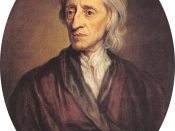What are the fundamental differences between the Enlightenment and the Great Awakening movements, and what if anything did these two movements have in common?
The Great Awakening and the Enlightenment were two historical events that shaped the thoughts of people and religion in the mid 1700's America. The Great Awakening began about the 1930's and reached its climax ten years later in 1740. They both formed and shaped the way many think today and brought lots of notions on human rights.
Beginning in the 1740's, the enlightenment was a reforming of religion. People started thinking differently about their religion. Prior to the enlightenment it was believed that everything that happened was because god wanted it to happen. However, after a series of events in Europe it started to become known that perhaps god didn't control our lives directly. This led to John Locke essay concerning human understanding which led many to embrace reasonable or rational religion.
Two Treatises on Government in which he goes against the belief in divine right. The whole idea behind divine right was that monarchs were direct descendants of god, and because of that they had a right to be the leader of the country. However, the enlightenment saw the emergence of the deists who believed that god, having created perfect universe, did not miraculously intervene in its workings, and did not have a direct influence on human life but rather left it alone to operate according to natural law. If god did not control our lives directly then these monarchs were no better then the rest of the population. These ideas eventually had a profound effect on the Colonies. This new belief that the King and Queen of England were no better then the rest of the Colonists is what allowed them to have...



Suggestion
This essay could have used better organization -- less paragraphs, more condensed and focused content.
3 out of 3 people found this comment useful.